Module 2 Education学案导学课件
文档属性
| 名称 | Module 2 Education学案导学课件 |
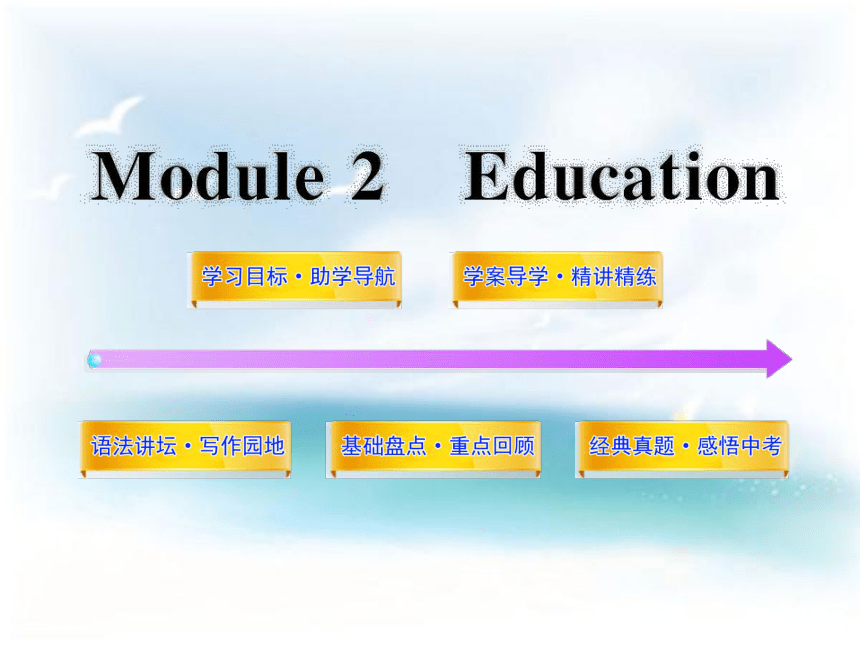
|
|
| 格式 | zip | ||
| 文件大小 | 656.0KB | ||
| 资源类型 | 教案 | ||
| 版本资源 | 外研版 | ||
| 科目 | 英语 | ||
| 更新时间 | 2014-01-20 00:00:00 | ||
图片预览

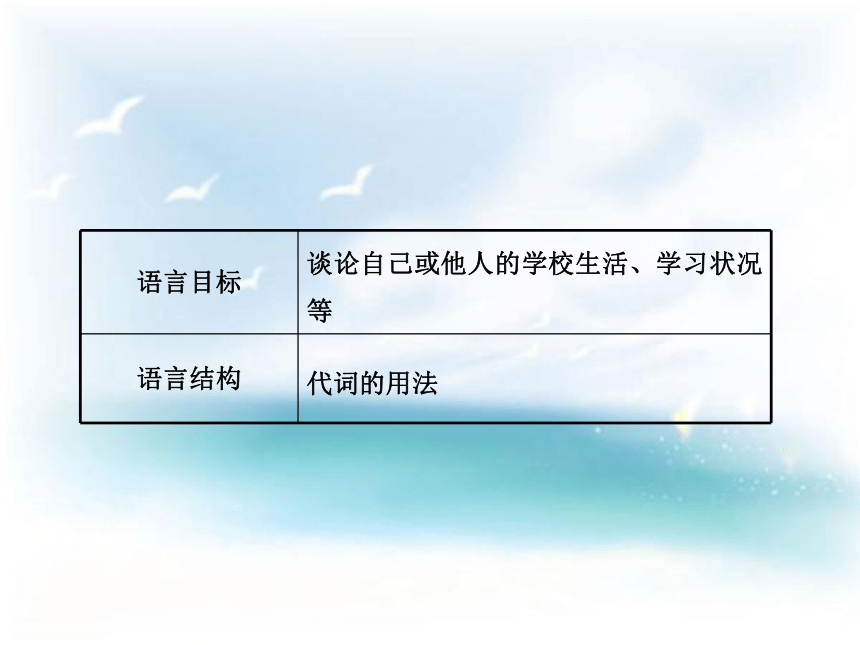
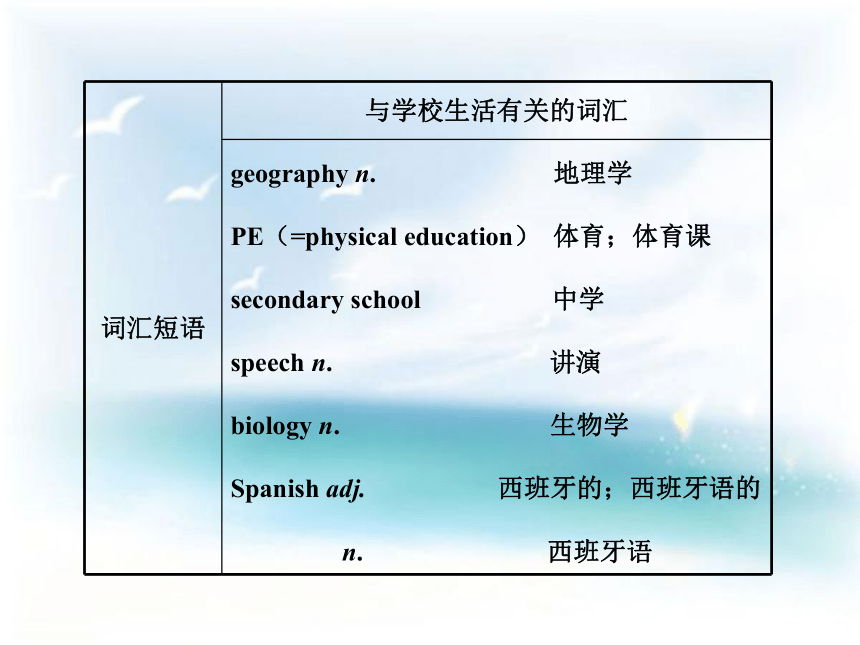
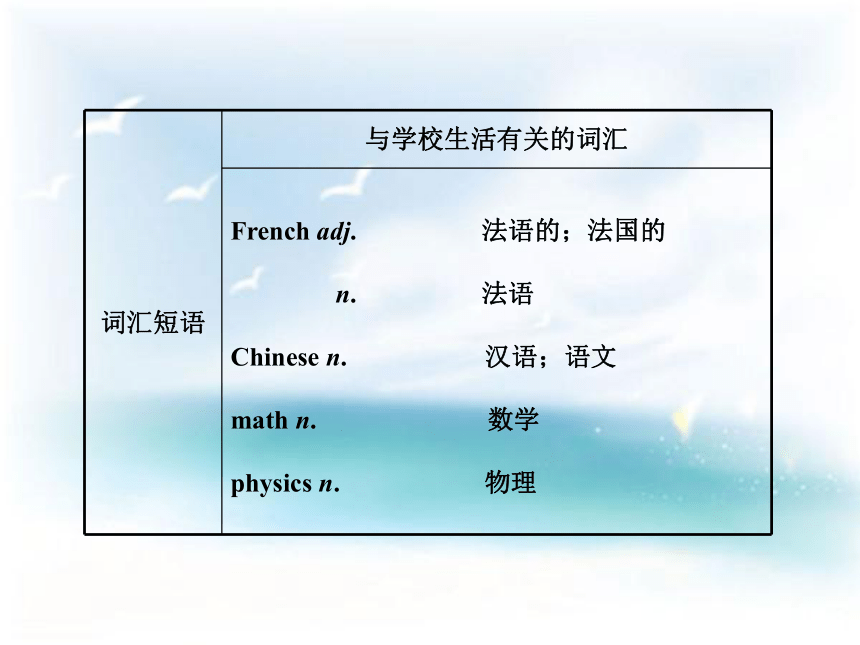
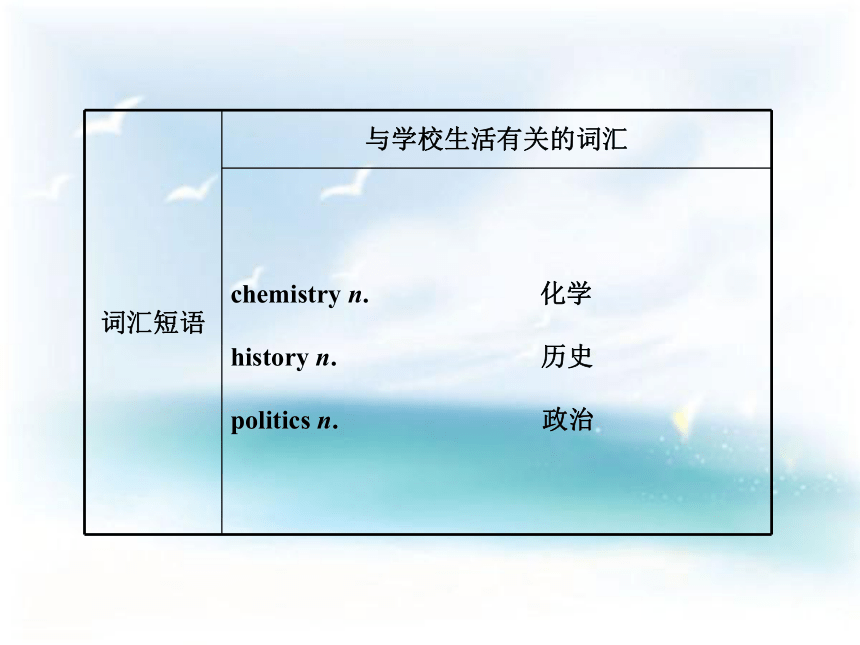
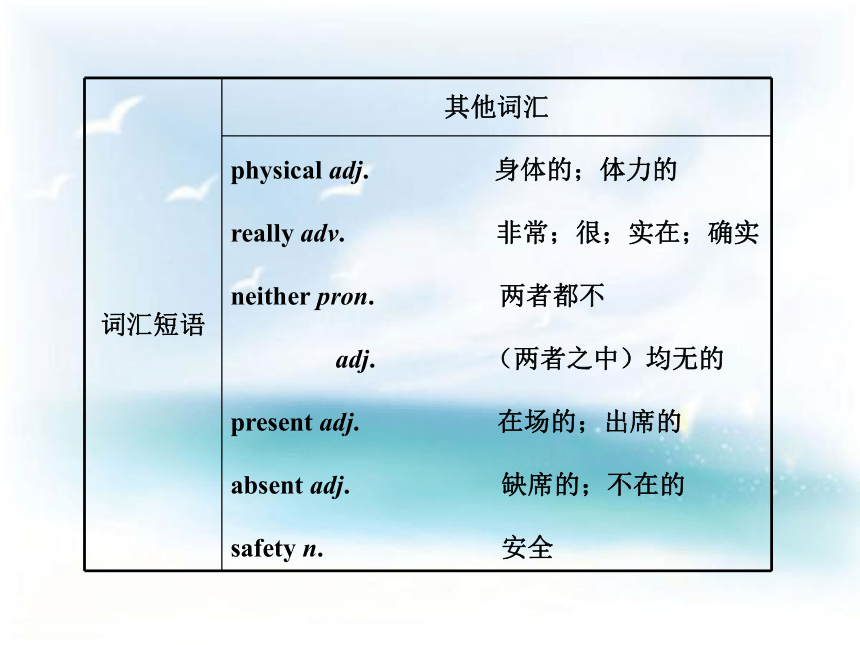
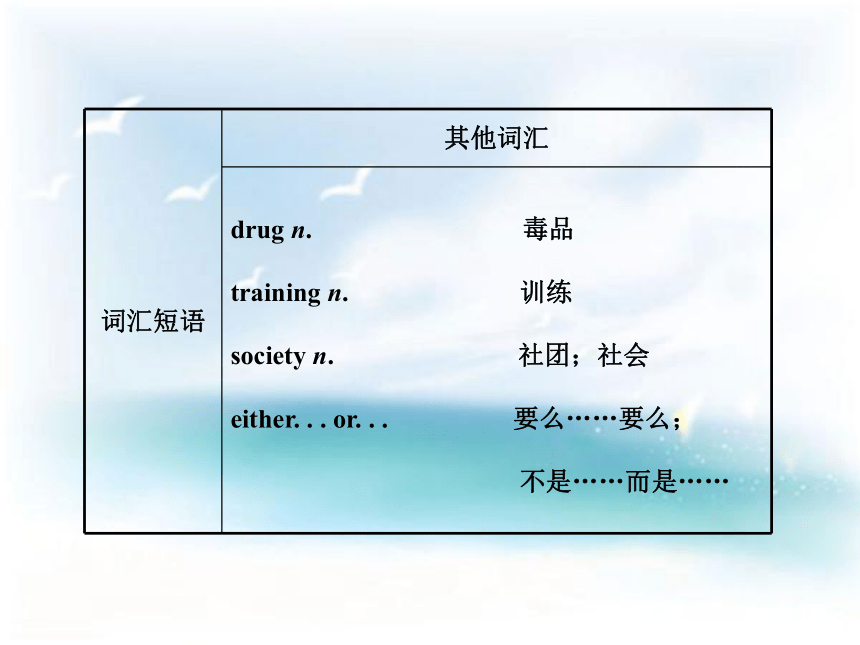
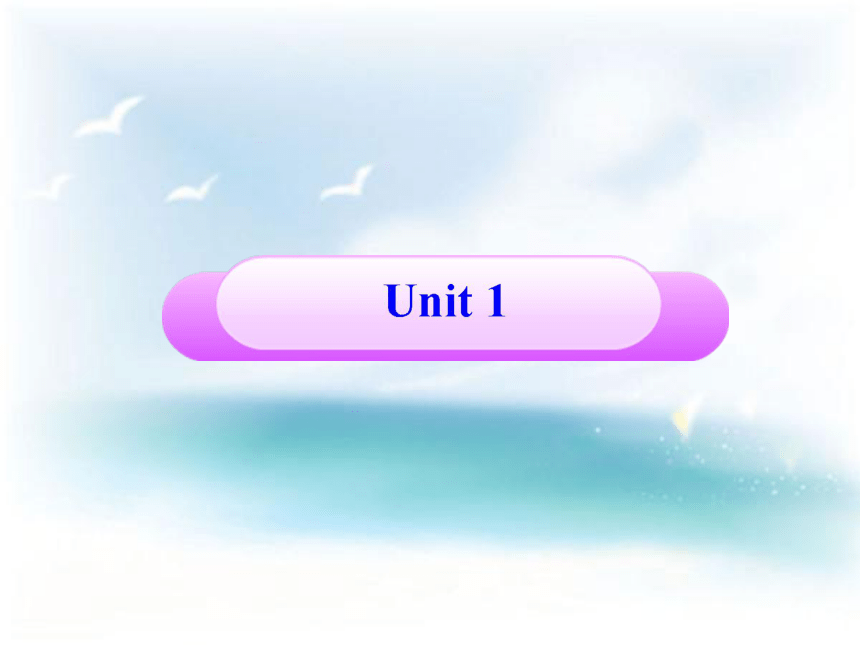
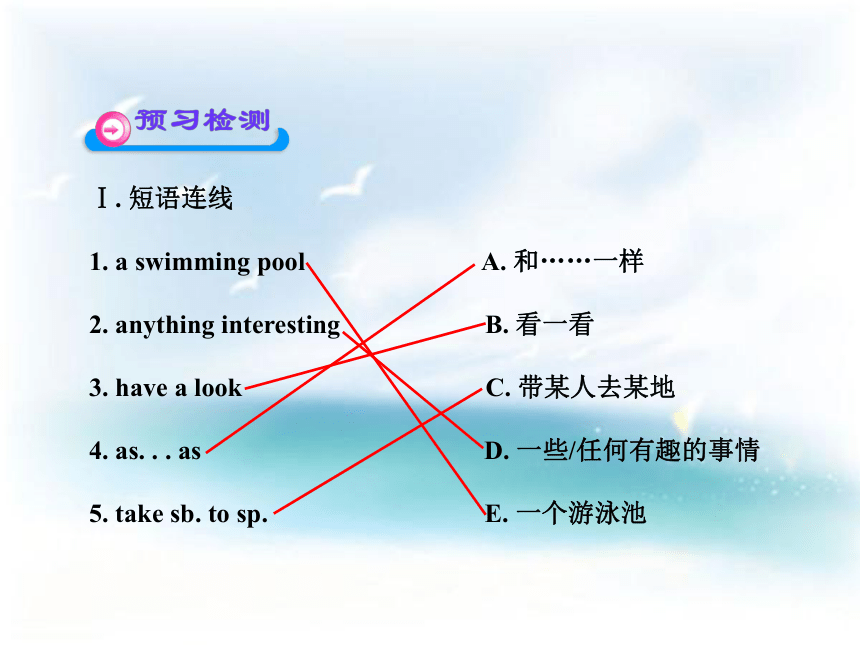
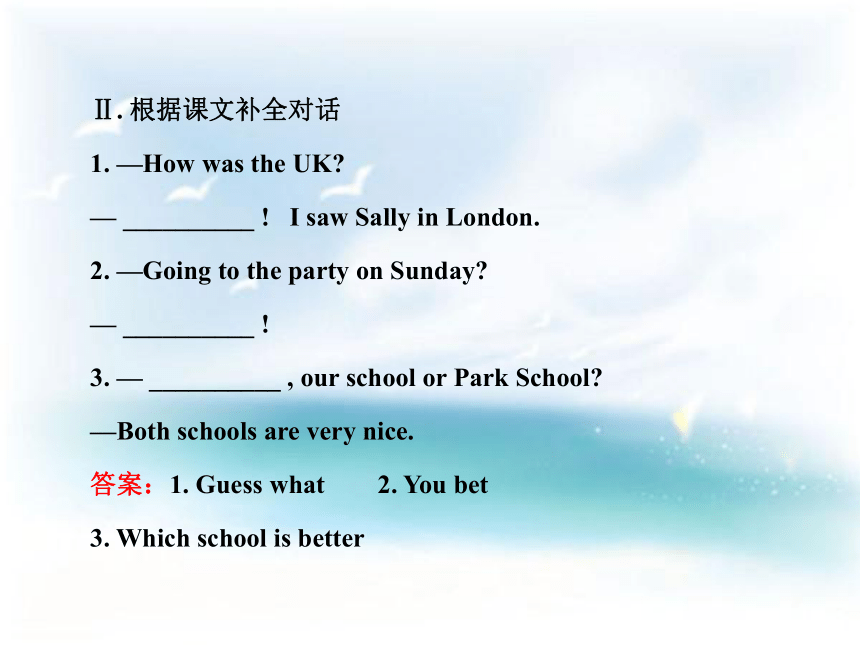
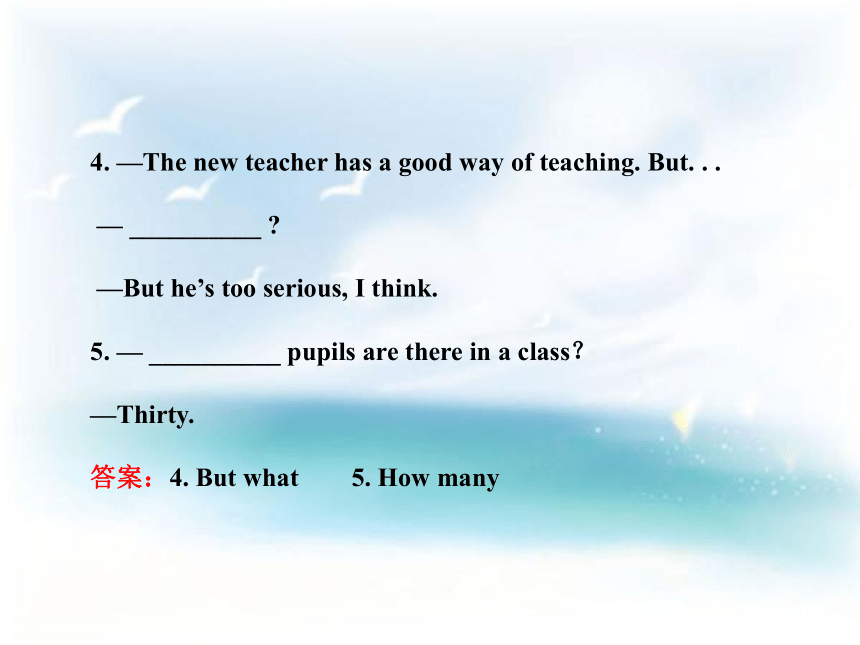

文档简介
课件88张PPT。Ⅰ. 短语连线
1. a swimming pool A. 和……一样
2. anything interesting B. 看一看
3. have a look C. 带某人去某地
4. as. . . as D. 一些/任何有趣的事情
5. take sb. to sp. E. 一个游泳池Ⅱ. 根据课文补全对话
1. —How was the UK?
— __________ ! I saw Sally in London.
2. —Going to the party on Sunday?
— __________ !
3. — __________ , our school or Park School?
—Both schools are very nice.
答案:1. Guess what 2. You bet
3. Which school is better 4. —The new teacher has a good way of teaching. But. . .
— __________ ?
—But he’s too serious, I think.
5. — __________ pupils are there in a class?
—Thirty.
答案:4. But what 5. How many1. It was great to see her again.
很高兴又见到她了。
It’s+adj. +to do sth. 是固定句型, 不定式短语之前可以加上某人,构成It’s +adj. +(for sb. )to do sth. 的结构,意思是“(对某人来说)做某事是……的”。在该句型中it是形式主语,真正的主语是后面的不定式短语。 It’s very happy ______ us to hear the news that Li Na won the championship in the French Open yesterday.
A. of B. for C. to D. with
【解析】选B。这里考查的是It’s+adj. +for sb. +to do sth. 结构,意思是“我们很高兴听到李娜昨天获得了法网公开赛冠军的消息”。此结构中sb. 前用for和of的区别。
(1)It is +adj. +for sb. to do sth.
该句型中的形容词用来描述事物的性质、说明不定式的情况。此类形容词有easy, hard, difficult, important等。此句型可转化为:To do sth. is +adj. +for sb.
(2)It is +adj. + of sb. to do sth.
该句型中的形容词用来描述人物的性格、品质或特征等。此类形容词有good, kind, nice等。此句型可转化为 sb. is +adj. + to do sth. 或 That is +adj. + of sb. to do sth. 。2. neither 两者都不;(两者之中)均无的
?Neither school has anything the other hasn’t got.
一个学校没有的东西,另一个学校也没有。
neither可以作主语、宾语和定语。用作代词时,意思是“两者都不”;用作形容词时,意思是“(两者中)均无的”。 ______ of the hats suited him, so Jack had to try on the third one.
A. Neither B. Either
C. Both D. None
【点拨】选A。根据后半句“于是杰克不得不试戴了第三顶帽子”,可知前两顶没有一个适合,neither有“两者都不”的含义,因此选择A。neither/none
(1)neither意为“两者都不”;none意为“三者或三者以上都不”。
(2)两者用作代词作主语时,neither的谓语动词用单数,而none则单复数均可。
(3)neither用作形容词时,用在单数名词之前,谓语动词用单数。【温馨提示】neither的反义词为both,意为“两者都……”,其后用复数。
neither. . . nor. . . 既不……也不……,连接两个主语时,谓语动词要遵循就近原则。3. prefer更喜欢;较喜欢
?But I prefer our school. 但是我更喜欢我们的学校。
prefer 后接表示更喜欢或愿意做的事,常和to连用,意思是“喜欢……,而不喜欢……”, to后接表示不喜欢或者不愿意做的事,此时to 为介词,后接名词或动名词。 The little boy told his teacher that he preferred ______ to ______ in English learning.
A. to speak; listen B. speaking; listening
C. speaking; listen D. to speak; listening
【解析】选B。prefer doing sth. to doing sth. “比起……来更喜欢……”,故答案选B。prefer意为“宁可,宁愿(选择);较喜欢,更喜欢”等, 常用于以下结构:
(1)prefer sth. “更喜欢某事物”
(2)prefer sth. to sth. “比起……更喜欢……”
(3)prefer doing sth. to doing sth. “比起做……更喜欢做”
(4)prefer to do sth. “更喜欢做……”
(5)prefer to do sth. rather than do sth. “宁愿做……而不愿做……”Ⅰ. 单项选择(5分钟,10分)
( )1. —Which one do you______, coffee or tea?
—Tea.
A. prefer B. prefer better
C. like D. like best
( )2. Wait a minute, I have______to tell you.
A. something interested B. something interesting
C. interesting something D. anything interesting ( )3. Who is_____at Chinese, Li Ming or Li Ping?
A. good B. well C. better D. best
( ) 4. —What do you usually do in your spare time, playing the violin or the piano?
—I do_______of them. I practice singing.
A. either B. both C. all D. neither( )5. The boys _______ are playing football are from Class One.
A. who B. whom C. whose D. whichⅡ. 句型展示(5分钟,10分)
1. 现在学好计算机是很重要的。
It is very important ______ ______ computer well these days.
2. 你们英语老师人怎么样?
What ______ your English teacher ______ ?
3. 让我看一看你的新外套。
Let me ______ ______ ______ ______ your new coat.
答案:1. to learn 2. is; like 3. have a look at 4. 我认为她不会拒绝他的邀请。
______ ______ that she won’t refuse his invitation.
5. 我们的学校没有他们的学校那么大。
Our school is not ______ ______ _______ theirs.
答案:4. I bet 5. so big asⅠ. 选词配图
secondary school, speech, drug, training, disco
答案:1. disco 2. speech 3. secondary school答案:4. drug 5. trainingⅡ. 句型展示
1. 自从我11岁开始,就一直在伦敦的帕克学校。
I ______ ______ at Park School, London since I was 11.
2. 如果明年我通过考试的话,我会在这里学习到18岁。
If I ______ my exams next year, I’ll stay here ______ I’m 18.
答案:1. have been 2. pass;until 3. 帕克学校是一所中学,从家骑车到学校大约需要20分钟。
Park School is a secondary school, about 20 minutes by bike ______ ______ home.
4. 我们老师检查学生的出勤情况。
Our teacher checks which pupils ______ ______ or absent.
5. (下午)我们再上两节课,就放学了。
We have ______ ______ ______ before school finishes.
答案:3. away from 4. are present
5. two more lessons1. We have two more lessons before school finishes.
(下午)我们再上两节课,就放学了。
数词+more+名词 “再……(几个);另外……(几个) —Can you wait for me for two more minutes?
—Of course. (同义替换)
A. more than two B. two another
C. another two D. more two than
【点拨】选C。“再……(几个);另外……(几个)”共有两种表达方式: “数词+more+名词”和“another+数词+名词”。2. In ADT we also do things like learning to cook as well as drawing and design.
在艺术、设计与技术这门课中,我们不仅学习绘画与设计,还学其他的,如烹饪。
as well as常连接并列的单词或短语,连接并列主语时,在意义上通常强调前者,谓语动词与前一项一致。 选词填空
as well as/not only. . . but also/as well
He is ______ ______ clever ______ ______ hard-working.
【点拨】not only; but also 句意:他不仅聪明而且工作努力。 as well as/not only. . . but also. . . /as well
三者意思相近,都有“还,也”的含义,但用法不同:
(1)as well as意为“还有”、“不但……而且……”。在A as well as B的结构里,语意的重点在A,不在B。
(2)as well as和not only. . . but also. . . 同义,但后者的语意重点在后半句。
(3)as well是副词短语,意为“也”,相当于too, 它一般放在肯定句句末,有时和连词and或but搭配使用。Ⅰ. 用所给词的适当形式填空(5分钟,10分)
1. Mr. Black will make an interesting ______ (speak) today.
2. —How many people were ______ (present) at the meeting? —Two hundred.
3. PE ______ (involve)physical exercise, basketball, training in the gym and swimming.
答案:1. speech 2. present 3. involves 4. They come from France, so they speak ______ (France).
5. We will not go for a picnic if it ______ (rain) this Sunday.
答案:4. French 5. rainsⅡ. 单项选择(5分钟,10分)
( )1. The Smiths are repairing the roof as well as ______ the walls now.
A. paint B. to paint
C. painting D. paints
( )2. He will stay there for ______ days.
A. the other B. another three
C. more three D. other three ( )3. —Where are the Greens, may I ask?
— Well, they ______ to England. You can’t find them now.
A. have been B. are going to
C. have gone D. will go
( )4. —Your French is so good. How long have you been in France?
— ______ I was five.
A. Until B. Since C. When D. Before ( )5. We won’t start the meeting ______ our teacher arrives.
A. though B. until C. while D. or either. . . or. . . 要么……要么……;不是……而是……
?I didn’t expect to do well in either maths or geography, . . .
我没指望数学或者地理学得很好,……
either. . . or. . . ,意为“……或……, 不是……就是……”;表示两者之一,连接句中两个并列的成分。 Either you or I ______ going there tomorrow.
A. be B. are C. am D. is
【点拨】选C。句意:明天要么你去那儿,要么我去那儿。either. . . or. . . 连接两个名词或代词作主语时,其谓语动词应与其最近的一个主语在人称和数上保持一致,即遵循“就近原则”。Ⅰ. 单项选择(5分钟,10分)
( )1. —Can I park my car here?
—Yes. You can park on ______ side of the street.
A. either B. neither C. both D. all
( )2. Jack ______ a gold medal in swimming yesterday.
A. beat B. win C. won D. took( )3. It was a great day but we did not enjoy it ______ the beginning.
A. on B. for C. with D. at
( )4. I ______ a strange gift yesterday, and I still don’t know who it was from.
A. took B. accepted C. received D. brought( )5. I’ll bring ______ books with me tomorrow.
A. myself B. self C. my own D. own Ⅱ. 句型转换(5分钟,10分)
1. Either they or Li Lei is in the classroom. (改为一般疑问句)
______ either they ______ Li Lei in the classroom?
2. We usually visit our grandfather in Shanghai once a month. (对划线部分提问)
______ ______ do you usually visit your grandfather in Shanghai?
答案:1. Are ; or 2. How often3. The boy arrived at the beginning of the film last night. (对划线部分提问)
______ ______ the boy arrive last night?
4. I spend more time learning English in order to make greater progress this year. (改为同义句)
I spend more time learning English ______ ______ ______ ______ make greater progress this year.
答案:3. When did 4. so that I can5. They thought they could work out the problem. (改为否定句)
They ______ ______ they ______ work out the problem.
答案:didn’t think;could代词的用法
Ⅰ. 用所给词的适当形式填空
1. ______ (we) like to play football after class.
2. Yesterday was Li Ming’s birthday. I gave ______ (he) a scarf as a present.
答案:1. We 2. him3. —Who is knocking at the door?
—It’s ______ (I).
4. We each______ (need) to be careful with our studies.
5. Every flower ______ (be) beautiful.
答案:3. me 4. need 5. is 一、代词的分类:英语中的代词有人称代词、指示代词、物主代词、反身代词、疑问代词和不定代词等。 二、代词的用法:
1. 人称代词
1)人称代词主格在句中作主语或表语,宾格在句中作及物动词和介词的宾语,还可作表语。
2)人称代词的顺序:单数人称代词的排列顺序是:you, he/she, I; 复数人称代词的排列顺序是: ① .
【总结感悟】①we, you, they【巧学妙记】
人称代词口诀
人称代词分两格,主格宾格来分说。
主格句中作主语,宾语用的是宾格。
排列顺序分三种,单数形式二三一;
承认错误我第一;三人复数同出现,
排列顺序一二三。Ⅱ. 单项选择
1. ______ went to choose a Christmas tree yesterday.
A. My father and I B. I and my father
C. My father and me D. Me and my father
2. —Is this ______ sweater?
—No. ______ is in my bag.
A. your; Mine B. yours; My
C. your; My D. yours; Mine3. —Is this Lucy’s e-dictionary?
—No. ______ is in the schoolbag.
A. His B. Yours C. Hers D. Mine
4. Millie gave ______ a baby cat yesterday that hurt ______ when it fell from the tree.
A. me; it B. myself; itself
C. me; itself D. myself; itⅢ. 翻译句子
1. 他们在聚会上玩得很愉快。
___________________________________________________
2. 他自学了日语。
___________________________________________________
答案:1. They enjoyed themselves at the party.
2. He taught himself Japanese. /He learned Japanese by himself. 3. 你应该独立完成作业。
___________________________________________________
答案:You should finish your homework by yourself. 2. 物主代词
1)形容词性物主代词只能作定语, 修饰名词, 相当于形容词。
2)名词性物主代词(不修饰其他成分),可作主语、宾语和表语,相当于名词。 3. 反身代词
1)反身代词表示主语发出的动作落在主语自己身上, 或用来加强名词或代词的语气。
2)常与以下动词或词组连用: hurt, dress, enjoy, say to, talk to, teach, help, look after。
3)可以与介词连用: by oneself意为“单独地,独自地(不需要别人帮忙)”;for oneself意为“ 亲自地;为自己”。 Ⅳ. 从方框中选词填空
either, both, all, none, neither
1. ______ of his parents are teachers.
2. The students in Class One ______ went to the park last Saturday.
3. There are willows(垂柳) on ______ side of the river.
答案:1. Both 2. all 3. either4. —Which sweater do you prefer, the yellow one or the pink one?
— ______ . I like the light blue one.
5. —How many students are there on the playground?
— ______ .
答案:4. Neither 5. None 4. 部分不定代词的用法
1)some,any的用法
一般情况下,肯定句中用 ② ,否定句、疑问句和条件句中用 ③ 。但 ④ 也用于表示建议、邀请、请求或希望得到对方肯定回答的疑问句中; ⑤ 也可用于肯定句中,表示“任何一个”,“任何一些”。
【总结感悟】②some ③any ④some ⑤any 2)both, either, neither的用法:
(1)both表示“两者都”,both. . . and. . . 连接并列主语时,谓语动词用复数。
(2)either表示“两者中任何一个”,“either+of+名词/代词”结构中的名词或代词要用复数形式,该结构作主语时,谓语动词用单数。
(3)neither表示“两者都不”,和both意义相反。neither作主语时,谓语动词用单数,作定语时,后接单数名词,谓语动词用单数。 3)little, a little, few, a few的用法
(1)few, “几乎没有”,表示 ⑥ ;a few,“一些”,表示肯定;均用于修饰可数名词复数。
(2)little,“几乎没有”,表示否定;a little,“一点”,表示 ⑦ ;均用于修饰 ⑧ 。
【总结感悟】⑥否定 ⑦肯定 ⑧不可数名词4)each,every的用法 实施规范办学以后,学生自主学习的时间多了。假设学校英语俱乐部委托你做一项关于“实施规范办学以后,学生怎样利用双休日”的问卷调查,请根据下列图表中的调查数据,以“A Report on Weekend Activities”为题,用英语写一篇短文,简单介绍调查情况并发表自己的看法,至少两点。注意:1. 词数100左右,短文开头已给出,不计入总词数;
2. 参考词汇:对……做调查: do an investigation on. . . A Report on Weekend Activities
Since the regular school-running policy was performed, the students now have more free time on Saturdays and Sundays. So the English Club in our school invited me to. . . 这篇作文是围绕“学校生活”这个中心话题,谈论在各地实施规范办学以后,学生怎样利用双休日的。
根据以上分析我们应当明确以下几点:
(1)由此作文要谈论的主要内容决定我们在写作过程中要运用的主要时态为:一般现在时。
(2)由此作文所涉及的话题决定我们在写作过程中会用到表示建议的一些词语。A Report on Weekend Activities
Since the regular school-running policy was performed, the students now have more free time on Saturdays and Sundays. So the English Club in our school invited me to do an investigation on how the students spend their weekends. I find that almost half of the students study by themselves at home. About 25% of them prefer to watch TV or listen to music. Nearly 20% of them like to chat online or play computer games, while 10% of them help their parents do housework. Only a small number of them go in for sports or traveling. In my opinion, all of us students should have a proper plan for our weekends. We should make good use of our time to learn more knowledge and develop our interests. We should also learn to relax, but I don’t think it’s a good idea to spend too much time watching TV, chatting online or playing computer games. Ⅰ. 单词闯关
1. 地理学 n. ______
2. 体育 ______
(= ______ ______ )
3. 非常,很;实在;确实 adv. ______
4. 两者都不; (两者之中)均无的pron. & adj.
______
答案:1. geography 2. PE;physical education
3. really 4. neither5. 安全n. ______
6. 毒品n. ______
7. 训练n. ______
8. 社团;协会n. ______
答案:5. safety 6. drug 7. training 8. societyⅡ. 短语过关
1. 参加考试 ______ exams
2. 离……远, 遥远 be far ______ ______
3. 发表演讲 make ______ ______
4. 代表 ______ ______
5也;还;而且 ______ well ______
6. 代替 ______ ______
答案:1. take 2. away from 3. a speech
4. stand for 5. as ;as 6. instead of 7从……到…… (指时间/地点) ______ . . . ______ . . .
8. 出勤/缺席 ______ ______ / ______
9. 在……之初 at the ______ ______. . .
10. 既不……也不…… ______. . . ______
11. 或者/要么/不是……或者/要么/而是……
______. . . ______ . . .
答案:7. from; to 8. be present/absent
9. beginning of 10. neither;nor 11. either; or12. 聚集 ______ ______
13. 至少 ______ ______
答案:12. get together 13. at leastⅢ. 句型攻关
1. 你做什么有趣的事情了吗?
Did you do ______ ______ ?
2. 它(学校)怎么样?
What ______ it ______?
3. 它不像我们的那么大。
It isn’t ______ ______ ______ ours.
答案:1. anything interesting 2. is; like 3. as big as4. 两所学校都很好。
______ schools are very nice.
5. 没有哪所学校拥有另外一所学校所没有的东西。
And ______ school has ______ the other hasn’t got.
6. (下午)我们再上两节课,就放学了。
We have ______ ______ ______ before school finishes.
答案:4. Both 5. neither; anything
6. two more lessons7. 我没有料到会考好数学或地理。
I didn’t expect to do well in ______ ______ ______ ______
答案:either maths or geography. ( )1. ______ is dangerous for us to swim in the river alone.
A. It B. That
C. This
【解析】选A。考查固定句式:“It is +adj. +for sb. to do sth. ”“做某事对某人来说……”。( )2. Jane’s mother preferred ______ TV at home to ______ to the concert.
A. to watch; go B. watching; going
C. watching; go D. to watch; going
【解析】选B。prefer doing sth. to doing sth. “比起……来更喜欢……”,故答案选B。( )3. My sister has practiced tennis for a long time. She plays tennis ______ you.
A. as good as B. so well as
C. as well as
【解析】选C。此题考查as. . . as的用法,意思是“和……一样”; 修饰动词play用副词well,所以选C。( )4.—Mom, Bill is coming to dinner this evening.
—OK. Let’s give him ______ to eat.
A. anything different B. different anything
C. something different D. different something
【解析】选C。此题考查不定代词的用法,形容词修饰不定代词时,需要放在不定代词的后面;同时肯定句中用something, 故答案选C。( )5. [10·镇江中考]—The Summer Palace is wonderful. Have you ever visited any other interesting places?
—Yes. Also, we ______ to the Great Wall.
A. have gone B. have been
C. had gone D. had been
【解析】选B。“have/has been to +地点”表示“曾经去过某地(但现在已不在那儿)”,根据答语可知说话人此时已经回来了,因此选择B。Thank you!
1. a swimming pool A. 和……一样
2. anything interesting B. 看一看
3. have a look C. 带某人去某地
4. as. . . as D. 一些/任何有趣的事情
5. take sb. to sp. E. 一个游泳池Ⅱ. 根据课文补全对话
1. —How was the UK?
— __________ ! I saw Sally in London.
2. —Going to the party on Sunday?
— __________ !
3. — __________ , our school or Park School?
—Both schools are very nice.
答案:1. Guess what 2. You bet
3. Which school is better 4. —The new teacher has a good way of teaching. But. . .
— __________ ?
—But he’s too serious, I think.
5. — __________ pupils are there in a class?
—Thirty.
答案:4. But what 5. How many1. It was great to see her again.
很高兴又见到她了。
It’s+adj. +to do sth. 是固定句型, 不定式短语之前可以加上某人,构成It’s +adj. +(for sb. )to do sth. 的结构,意思是“(对某人来说)做某事是……的”。在该句型中it是形式主语,真正的主语是后面的不定式短语。 It’s very happy ______ us to hear the news that Li Na won the championship in the French Open yesterday.
A. of B. for C. to D. with
【解析】选B。这里考查的是It’s+adj. +for sb. +to do sth. 结构,意思是“我们很高兴听到李娜昨天获得了法网公开赛冠军的消息”。此结构中sb. 前用for和of的区别。
(1)It is +adj. +for sb. to do sth.
该句型中的形容词用来描述事物的性质、说明不定式的情况。此类形容词有easy, hard, difficult, important等。此句型可转化为:To do sth. is +adj. +for sb.
(2)It is +adj. + of sb. to do sth.
该句型中的形容词用来描述人物的性格、品质或特征等。此类形容词有good, kind, nice等。此句型可转化为 sb. is +adj. + to do sth. 或 That is +adj. + of sb. to do sth. 。2. neither 两者都不;(两者之中)均无的
?Neither school has anything the other hasn’t got.
一个学校没有的东西,另一个学校也没有。
neither可以作主语、宾语和定语。用作代词时,意思是“两者都不”;用作形容词时,意思是“(两者中)均无的”。 ______ of the hats suited him, so Jack had to try on the third one.
A. Neither B. Either
C. Both D. None
【点拨】选A。根据后半句“于是杰克不得不试戴了第三顶帽子”,可知前两顶没有一个适合,neither有“两者都不”的含义,因此选择A。neither/none
(1)neither意为“两者都不”;none意为“三者或三者以上都不”。
(2)两者用作代词作主语时,neither的谓语动词用单数,而none则单复数均可。
(3)neither用作形容词时,用在单数名词之前,谓语动词用单数。【温馨提示】neither的反义词为both,意为“两者都……”,其后用复数。
neither. . . nor. . . 既不……也不……,连接两个主语时,谓语动词要遵循就近原则。3. prefer更喜欢;较喜欢
?But I prefer our school. 但是我更喜欢我们的学校。
prefer 后接表示更喜欢或愿意做的事,常和to连用,意思是“喜欢……,而不喜欢……”, to后接表示不喜欢或者不愿意做的事,此时to 为介词,后接名词或动名词。 The little boy told his teacher that he preferred ______ to ______ in English learning.
A. to speak; listen B. speaking; listening
C. speaking; listen D. to speak; listening
【解析】选B。prefer doing sth. to doing sth. “比起……来更喜欢……”,故答案选B。prefer意为“宁可,宁愿(选择);较喜欢,更喜欢”等, 常用于以下结构:
(1)prefer sth. “更喜欢某事物”
(2)prefer sth. to sth. “比起……更喜欢……”
(3)prefer doing sth. to doing sth. “比起做……更喜欢做”
(4)prefer to do sth. “更喜欢做……”
(5)prefer to do sth. rather than do sth. “宁愿做……而不愿做……”Ⅰ. 单项选择(5分钟,10分)
( )1. —Which one do you______, coffee or tea?
—Tea.
A. prefer B. prefer better
C. like D. like best
( )2. Wait a minute, I have______to tell you.
A. something interested B. something interesting
C. interesting something D. anything interesting ( )3. Who is_____at Chinese, Li Ming or Li Ping?
A. good B. well C. better D. best
( ) 4. —What do you usually do in your spare time, playing the violin or the piano?
—I do_______of them. I practice singing.
A. either B. both C. all D. neither( )5. The boys _______ are playing football are from Class One.
A. who B. whom C. whose D. whichⅡ. 句型展示(5分钟,10分)
1. 现在学好计算机是很重要的。
It is very important ______ ______ computer well these days.
2. 你们英语老师人怎么样?
What ______ your English teacher ______ ?
3. 让我看一看你的新外套。
Let me ______ ______ ______ ______ your new coat.
答案:1. to learn 2. is; like 3. have a look at 4. 我认为她不会拒绝他的邀请。
______ ______ that she won’t refuse his invitation.
5. 我们的学校没有他们的学校那么大。
Our school is not ______ ______ _______ theirs.
答案:4. I bet 5. so big asⅠ. 选词配图
secondary school, speech, drug, training, disco
答案:1. disco 2. speech 3. secondary school答案:4. drug 5. trainingⅡ. 句型展示
1. 自从我11岁开始,就一直在伦敦的帕克学校。
I ______ ______ at Park School, London since I was 11.
2. 如果明年我通过考试的话,我会在这里学习到18岁。
If I ______ my exams next year, I’ll stay here ______ I’m 18.
答案:1. have been 2. pass;until 3. 帕克学校是一所中学,从家骑车到学校大约需要20分钟。
Park School is a secondary school, about 20 minutes by bike ______ ______ home.
4. 我们老师检查学生的出勤情况。
Our teacher checks which pupils ______ ______ or absent.
5. (下午)我们再上两节课,就放学了。
We have ______ ______ ______ before school finishes.
答案:3. away from 4. are present
5. two more lessons1. We have two more lessons before school finishes.
(下午)我们再上两节课,就放学了。
数词+more+名词 “再……(几个);另外……(几个) —Can you wait for me for two more minutes?
—Of course. (同义替换)
A. more than two B. two another
C. another two D. more two than
【点拨】选C。“再……(几个);另外……(几个)”共有两种表达方式: “数词+more+名词”和“another+数词+名词”。2. In ADT we also do things like learning to cook as well as drawing and design.
在艺术、设计与技术这门课中,我们不仅学习绘画与设计,还学其他的,如烹饪。
as well as常连接并列的单词或短语,连接并列主语时,在意义上通常强调前者,谓语动词与前一项一致。 选词填空
as well as/not only. . . but also/as well
He is ______ ______ clever ______ ______ hard-working.
【点拨】not only; but also 句意:他不仅聪明而且工作努力。 as well as/not only. . . but also. . . /as well
三者意思相近,都有“还,也”的含义,但用法不同:
(1)as well as意为“还有”、“不但……而且……”。在A as well as B的结构里,语意的重点在A,不在B。
(2)as well as和not only. . . but also. . . 同义,但后者的语意重点在后半句。
(3)as well是副词短语,意为“也”,相当于too, 它一般放在肯定句句末,有时和连词and或but搭配使用。Ⅰ. 用所给词的适当形式填空(5分钟,10分)
1. Mr. Black will make an interesting ______ (speak) today.
2. —How many people were ______ (present) at the meeting? —Two hundred.
3. PE ______ (involve)physical exercise, basketball, training in the gym and swimming.
答案:1. speech 2. present 3. involves 4. They come from France, so they speak ______ (France).
5. We will not go for a picnic if it ______ (rain) this Sunday.
答案:4. French 5. rainsⅡ. 单项选择(5分钟,10分)
( )1. The Smiths are repairing the roof as well as ______ the walls now.
A. paint B. to paint
C. painting D. paints
( )2. He will stay there for ______ days.
A. the other B. another three
C. more three D. other three ( )3. —Where are the Greens, may I ask?
— Well, they ______ to England. You can’t find them now.
A. have been B. are going to
C. have gone D. will go
( )4. —Your French is so good. How long have you been in France?
— ______ I was five.
A. Until B. Since C. When D. Before ( )5. We won’t start the meeting ______ our teacher arrives.
A. though B. until C. while D. or either. . . or. . . 要么……要么……;不是……而是……
?I didn’t expect to do well in either maths or geography, . . .
我没指望数学或者地理学得很好,……
either. . . or. . . ,意为“……或……, 不是……就是……”;表示两者之一,连接句中两个并列的成分。 Either you or I ______ going there tomorrow.
A. be B. are C. am D. is
【点拨】选C。句意:明天要么你去那儿,要么我去那儿。either. . . or. . . 连接两个名词或代词作主语时,其谓语动词应与其最近的一个主语在人称和数上保持一致,即遵循“就近原则”。Ⅰ. 单项选择(5分钟,10分)
( )1. —Can I park my car here?
—Yes. You can park on ______ side of the street.
A. either B. neither C. both D. all
( )2. Jack ______ a gold medal in swimming yesterday.
A. beat B. win C. won D. took( )3. It was a great day but we did not enjoy it ______ the beginning.
A. on B. for C. with D. at
( )4. I ______ a strange gift yesterday, and I still don’t know who it was from.
A. took B. accepted C. received D. brought( )5. I’ll bring ______ books with me tomorrow.
A. myself B. self C. my own D. own Ⅱ. 句型转换(5分钟,10分)
1. Either they or Li Lei is in the classroom. (改为一般疑问句)
______ either they ______ Li Lei in the classroom?
2. We usually visit our grandfather in Shanghai once a month. (对划线部分提问)
______ ______ do you usually visit your grandfather in Shanghai?
答案:1. Are ; or 2. How often3. The boy arrived at the beginning of the film last night. (对划线部分提问)
______ ______ the boy arrive last night?
4. I spend more time learning English in order to make greater progress this year. (改为同义句)
I spend more time learning English ______ ______ ______ ______ make greater progress this year.
答案:3. When did 4. so that I can5. They thought they could work out the problem. (改为否定句)
They ______ ______ they ______ work out the problem.
答案:didn’t think;could代词的用法
Ⅰ. 用所给词的适当形式填空
1. ______ (we) like to play football after class.
2. Yesterday was Li Ming’s birthday. I gave ______ (he) a scarf as a present.
答案:1. We 2. him3. —Who is knocking at the door?
—It’s ______ (I).
4. We each______ (need) to be careful with our studies.
5. Every flower ______ (be) beautiful.
答案:3. me 4. need 5. is 一、代词的分类:英语中的代词有人称代词、指示代词、物主代词、反身代词、疑问代词和不定代词等。 二、代词的用法:
1. 人称代词
1)人称代词主格在句中作主语或表语,宾格在句中作及物动词和介词的宾语,还可作表语。
2)人称代词的顺序:单数人称代词的排列顺序是:you, he/she, I; 复数人称代词的排列顺序是: ① .
【总结感悟】①we, you, they【巧学妙记】
人称代词口诀
人称代词分两格,主格宾格来分说。
主格句中作主语,宾语用的是宾格。
排列顺序分三种,单数形式二三一;
承认错误我第一;三人复数同出现,
排列顺序一二三。Ⅱ. 单项选择
1. ______ went to choose a Christmas tree yesterday.
A. My father and I B. I and my father
C. My father and me D. Me and my father
2. —Is this ______ sweater?
—No. ______ is in my bag.
A. your; Mine B. yours; My
C. your; My D. yours; Mine3. —Is this Lucy’s e-dictionary?
—No. ______ is in the schoolbag.
A. His B. Yours C. Hers D. Mine
4. Millie gave ______ a baby cat yesterday that hurt ______ when it fell from the tree.
A. me; it B. myself; itself
C. me; itself D. myself; itⅢ. 翻译句子
1. 他们在聚会上玩得很愉快。
___________________________________________________
2. 他自学了日语。
___________________________________________________
答案:1. They enjoyed themselves at the party.
2. He taught himself Japanese. /He learned Japanese by himself. 3. 你应该独立完成作业。
___________________________________________________
答案:You should finish your homework by yourself. 2. 物主代词
1)形容词性物主代词只能作定语, 修饰名词, 相当于形容词。
2)名词性物主代词(不修饰其他成分),可作主语、宾语和表语,相当于名词。 3. 反身代词
1)反身代词表示主语发出的动作落在主语自己身上, 或用来加强名词或代词的语气。
2)常与以下动词或词组连用: hurt, dress, enjoy, say to, talk to, teach, help, look after。
3)可以与介词连用: by oneself意为“单独地,独自地(不需要别人帮忙)”;for oneself意为“ 亲自地;为自己”。 Ⅳ. 从方框中选词填空
either, both, all, none, neither
1. ______ of his parents are teachers.
2. The students in Class One ______ went to the park last Saturday.
3. There are willows(垂柳) on ______ side of the river.
答案:1. Both 2. all 3. either4. —Which sweater do you prefer, the yellow one or the pink one?
— ______ . I like the light blue one.
5. —How many students are there on the playground?
— ______ .
答案:4. Neither 5. None 4. 部分不定代词的用法
1)some,any的用法
一般情况下,肯定句中用 ② ,否定句、疑问句和条件句中用 ③ 。但 ④ 也用于表示建议、邀请、请求或希望得到对方肯定回答的疑问句中; ⑤ 也可用于肯定句中,表示“任何一个”,“任何一些”。
【总结感悟】②some ③any ④some ⑤any 2)both, either, neither的用法:
(1)both表示“两者都”,both. . . and. . . 连接并列主语时,谓语动词用复数。
(2)either表示“两者中任何一个”,“either+of+名词/代词”结构中的名词或代词要用复数形式,该结构作主语时,谓语动词用单数。
(3)neither表示“两者都不”,和both意义相反。neither作主语时,谓语动词用单数,作定语时,后接单数名词,谓语动词用单数。 3)little, a little, few, a few的用法
(1)few, “几乎没有”,表示 ⑥ ;a few,“一些”,表示肯定;均用于修饰可数名词复数。
(2)little,“几乎没有”,表示否定;a little,“一点”,表示 ⑦ ;均用于修饰 ⑧ 。
【总结感悟】⑥否定 ⑦肯定 ⑧不可数名词4)each,every的用法 实施规范办学以后,学生自主学习的时间多了。假设学校英语俱乐部委托你做一项关于“实施规范办学以后,学生怎样利用双休日”的问卷调查,请根据下列图表中的调查数据,以“A Report on Weekend Activities”为题,用英语写一篇短文,简单介绍调查情况并发表自己的看法,至少两点。注意:1. 词数100左右,短文开头已给出,不计入总词数;
2. 参考词汇:对……做调查: do an investigation on. . . A Report on Weekend Activities
Since the regular school-running policy was performed, the students now have more free time on Saturdays and Sundays. So the English Club in our school invited me to. . . 这篇作文是围绕“学校生活”这个中心话题,谈论在各地实施规范办学以后,学生怎样利用双休日的。
根据以上分析我们应当明确以下几点:
(1)由此作文要谈论的主要内容决定我们在写作过程中要运用的主要时态为:一般现在时。
(2)由此作文所涉及的话题决定我们在写作过程中会用到表示建议的一些词语。A Report on Weekend Activities
Since the regular school-running policy was performed, the students now have more free time on Saturdays and Sundays. So the English Club in our school invited me to do an investigation on how the students spend their weekends. I find that almost half of the students study by themselves at home. About 25% of them prefer to watch TV or listen to music. Nearly 20% of them like to chat online or play computer games, while 10% of them help their parents do housework. Only a small number of them go in for sports or traveling. In my opinion, all of us students should have a proper plan for our weekends. We should make good use of our time to learn more knowledge and develop our interests. We should also learn to relax, but I don’t think it’s a good idea to spend too much time watching TV, chatting online or playing computer games. Ⅰ. 单词闯关
1. 地理学 n. ______
2. 体育 ______
(= ______ ______ )
3. 非常,很;实在;确实 adv. ______
4. 两者都不; (两者之中)均无的pron. & adj.
______
答案:1. geography 2. PE;physical education
3. really 4. neither5. 安全n. ______
6. 毒品n. ______
7. 训练n. ______
8. 社团;协会n. ______
答案:5. safety 6. drug 7. training 8. societyⅡ. 短语过关
1. 参加考试 ______ exams
2. 离……远, 遥远 be far ______ ______
3. 发表演讲 make ______ ______
4. 代表 ______ ______
5也;还;而且 ______ well ______
6. 代替 ______ ______
答案:1. take 2. away from 3. a speech
4. stand for 5. as ;as 6. instead of 7从……到…… (指时间/地点) ______ . . . ______ . . .
8. 出勤/缺席 ______ ______ / ______
9. 在……之初 at the ______ ______. . .
10. 既不……也不…… ______. . . ______
11. 或者/要么/不是……或者/要么/而是……
______. . . ______ . . .
答案:7. from; to 8. be present/absent
9. beginning of 10. neither;nor 11. either; or12. 聚集 ______ ______
13. 至少 ______ ______
答案:12. get together 13. at leastⅢ. 句型攻关
1. 你做什么有趣的事情了吗?
Did you do ______ ______ ?
2. 它(学校)怎么样?
What ______ it ______?
3. 它不像我们的那么大。
It isn’t ______ ______ ______ ours.
答案:1. anything interesting 2. is; like 3. as big as4. 两所学校都很好。
______ schools are very nice.
5. 没有哪所学校拥有另外一所学校所没有的东西。
And ______ school has ______ the other hasn’t got.
6. (下午)我们再上两节课,就放学了。
We have ______ ______ ______ before school finishes.
答案:4. Both 5. neither; anything
6. two more lessons7. 我没有料到会考好数学或地理。
I didn’t expect to do well in ______ ______ ______ ______
答案:either maths or geography. ( )1. ______ is dangerous for us to swim in the river alone.
A. It B. That
C. This
【解析】选A。考查固定句式:“It is +adj. +for sb. to do sth. ”“做某事对某人来说……”。( )2. Jane’s mother preferred ______ TV at home to ______ to the concert.
A. to watch; go B. watching; going
C. watching; go D. to watch; going
【解析】选B。prefer doing sth. to doing sth. “比起……来更喜欢……”,故答案选B。( )3. My sister has practiced tennis for a long time. She plays tennis ______ you.
A. as good as B. so well as
C. as well as
【解析】选C。此题考查as. . . as的用法,意思是“和……一样”; 修饰动词play用副词well,所以选C。( )4.—Mom, Bill is coming to dinner this evening.
—OK. Let’s give him ______ to eat.
A. anything different B. different anything
C. something different D. different something
【解析】选C。此题考查不定代词的用法,形容词修饰不定代词时,需要放在不定代词的后面;同时肯定句中用something, 故答案选C。( )5. [10·镇江中考]—The Summer Palace is wonderful. Have you ever visited any other interesting places?
—Yes. Also, we ______ to the Great Wall.
A. have gone B. have been
C. had gone D. had been
【解析】选B。“have/has been to +地点”表示“曾经去过某地(但现在已不在那儿)”,根据答语可知说话人此时已经回来了,因此选择B。Thank you!
同课章节目录
- Module 1 Travel
- Unit 1 We toured the city by bus and by taxi
- Unit 2 It's a long story.
- Unit 3 Language in use
- Module 2 Education
- Unit 1 They don't sit in rows.
- Unit 2 What do I like best about school?
- Unit 3 Language in use
- Module 3 Life now and then
- Unit 1 They sometimes work harder.
- Unit 2 I think life is better today.
- Unit 3 Language in use.
- Module 4 Rules and suggestions
- Unit 1 You must be careful of falling stones.
- Unit 2 we must keep the camp clean.
- Unit 3 Language in use.
- Revison A
- Module 5 Look after yourself
- Unit 1 We'd better get you to hospital.
- Unit 2 Get off the sofa!
- Unit 3 Language in use.
- Module 6 Eating togethe
- Unit 1 When is the school-leavers' party?
- Unit 2 Knives and forks are used for most Western
- Unit 3 Language in use
- Module 7 English for you and me
- Unit 1 Have you ever been to an English corner?
- Unit 2 We all own English.
- Unit 3 Language in use
- Module 8 My future life
- Unit 1 Here's to our friendship and the future
- Unit 2 I know that you will be better at maths.
- Unit 3 Language in use
- Revison B
